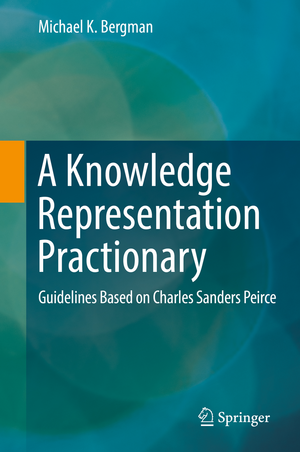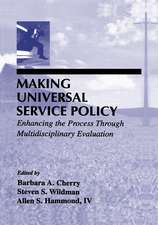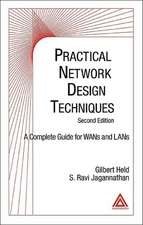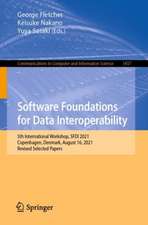A Knowledge Representation Practionary: Guidelines Based on Charles Sanders Peirce
Autor Michael K. Bergmanen Limba Engleză Hardback – 20 dec 2018
Knowledge representation is shorthand for how to represent human symbolic information and knowledge to computers to solve complex questions. KR applications range from semantic technologies and knowledge management and machine learning to information integration, data interoperability, and natural language understanding. Knowledge representation is an essential foundation for knowledge-based AI.
This book is structured into five parts. The first and last parts are bookends that first set the context and background and conclude with practical applications. The three main parts that are the meat of the approach first address the terminologies and grammar of knowledge representation, then building blocks for KR systems, and then design, build, test, and best practices in putting a system together. Throughout, the book refers to and leverages the open source KBpedia knowledge graph and its public knowledge bases, including Wikipedia and Wikidata. KBpedia is a ready baseline for users to bridge from and expand for their own domain needs and applications. It is built from the ground up to reflect Peircean principles.
This book is one of timeless, practical guidelines for how to think about KR and to design knowledge management (KM) systems. The book is grounded bedrock for enterprise information and knowledge managers who are contemplating a new knowledge initiative.
This book is an essential addition to theory and practice for KR and semantic technology and AI researchers and practitioners, who will benefit from Peirce's profound understanding of meaning and context.
Preț: 1287.28 lei
Preț vechi: 1609.09 lei
-20% Nou
Puncte Express: 1931
Preț estimativ în valută:
246.31€ • 257.87$ • 203.81£
246.31€ • 257.87$ • 203.81£
Carte tipărită la comandă
Livrare economică 07-21 aprilie
Preluare comenzi: 021 569.72.76
Specificații
ISBN-13: 9783319980911
ISBN-10: 3319980912
Pagini: 528
Ilustrații: XVII, 462 p. 28 illus., 16 illus. in color.
Dimensiuni: 155 x 235 x 30 mm
Greutate: 0.85 kg
Ediția:1st ed. 2018
Editura: Springer International Publishing
Colecția Springer
Locul publicării:Cham, Switzerland
ISBN-10: 3319980912
Pagini: 528
Ilustrații: XVII, 462 p. 28 illus., 16 illus. in color.
Dimensiuni: 155 x 235 x 30 mm
Greutate: 0.85 kg
Ediția:1st ed. 2018
Editura: Springer International Publishing
Colecția Springer
Locul publicării:Cham, Switzerland
Cuprins
1 Introduction.- 2 Information, Knowledge, Representation.- 3 The Situation.- 4 The Opportunity.- 5 The Precepts.- 6 The Universal Categories.- 7 A KR Terminology.- 8 KR Vocabulary and Languages.- 9 Keeping the Design Open.- 10 Modular, Expandable Typologies.- 11 Knowledge Graphs and Bases.- 12 Platforms and Knowledge Management.- 13 Building Out the System.- 14 Testing Best Practices.- 15 Potential Uses in Breadth.- 16 Potential Uses in Depth.- 17 Conclusion.
Recenzii
Notă biografică
Michael K. Bergman is a senior principal for Cognonto Corporation, and lead editor for the open-source KBpedia knowledge structure. For more than a decade, his AI3:::Adaptive Information blog has been a leading go-to resource on topics in semantic technologies, large-scale knowledge bases for machine learning, data interoperability, knowledge graphs and mapping, and fact and entity extraction and tagging. For the past twenty years Mike has been an entrepreneur, Web scientist, and independent consultant. For the decade up to 2018, Mike was the CEO of Structured Dynamics LLC, which he co-founded with Fred Giasson. Mike has held C-class positions and was a founder of the prior companies Zitgist LLC, BrightPlanet Corporation, VisualMetrics Corporation, and TheWebTools Company. These companies provided notable market advances in semantic technologies, data warehousing, the deep Web, large-scale Internet databases, meta-search tools, and bioinformatics. Bergman began his professional career in the mid-1970s as a project director for the U.S. EPA for a major energy study called the Coal Technology Assessment. He later taught in the Graduate School of Engineering at the University of Virginia, where he was a fellow in the Energy Policies Study Center. He then joined the American Public Power Association in 1982, where he rose to director of energy research. APPA's pioneering work with small computers sparked Bergman's transition to information technologies. Before entering industry, Mike was a doctoral candidate at Duke University in population genetics.
Caracteristici
Offers a fresh viewpoint on knowledge representation and ontology engineering Covers focused application of C.S. Peirce’s writings to KR ‘how-to-think’ guide versus mathematics and specific tools Provides direct use and interaction with the open-source KBpedia knowledge graph













